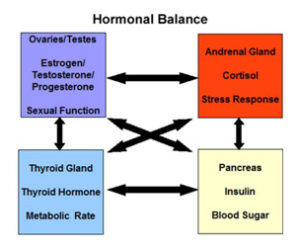Few things can affect our overall health and vitality more dramatically than small imbalances in the body’s hormone levels.
Unfortunately, not all of the tests commonly prescribed to determine hormone levels are equally accurate.

In a moment, I’ll discuss the available tests, and some approaches to accurately diagnosing hormone imbalances.
But first, a little background on hormones.
Hormones are the body’s chemical “messengers.” They are present in brain, heart, bones, muscles, and reproductive organs, and play a tremendously important role in the healthy functioning of every body cell.
Hormones work best when their levels are finely balanced. The symptoms of hormone imbalance can include:
- Weight gain
- Fluid retention
- PMS mood changes such as anger, irritability, and anxiety that can last from a day to two weeks
- Migraines and headaches
- Breast tenderness
- Heavy periods (or very light periods if estrogen/ progesterone levels are low)
- Breast lumps and cysts
- Infertility
Lifestyle factors can strongly influence hormone balance. The factors that can contribute to an imbalance include:
- Periods of unusually high stress
- Poor diet
- Inadequate sleep
- Ingesting synthetic hormones
- Insufficient exercise
Hormone Testing
The science of hormone testing has evolved over time. We are now able to test hormone levels by analyzing samples of blood, saliva, or urine.
European medicine tends to favor salivary testing. By examining saliva, we can measure the “free” forms of hormones, that is, hormones that are unbound by protein and that are therefore available to work in the body.
Salivary testing also allows us to more easily take multiple samples. This is useful, for example, when measuring levels of the common adrenal “stress hormone,” cortisol. Cortisol levels rise and fall in a daily cycle, and must therefore be measured four times throughout the day to assure an accurate measurement. This is in contrast to the adrenal hormone DHEA, which can be measured with a single saliva sample.
We can measure thyroid hormone from a blood sample or a 24-hour urine sample. Conventional medicine tends to favor blood testing to measure Thyroid Stimulating Hormone (TSH), a pituitary hormone that (in an ideal world) reflects thyroid function. The conventional prescription for low thyroid is Synthroid, which is the thyroid hormone thyroxine, known as T4. Monitoring of the drug’s effectiveness is done by testing blood levels of T4.
Thyroid hormone testing is, at best, subject to inaccuracies due to fluctuations that can make an accurate evaluation difficult.
For example, the interaction of the pituitary and thyroid glands can be inconsistent, and can raise and lower thyroid hormone levels.
Also, because T4 needs to be converted to its more active metabolite T3 before the body can use it, the most reliable approach to thyroid hormone testing involves analyzing a blood sample for levels of not one but three thyroid hormones: TSH, free T4, and free T3.
 Our bodies are highly individual, and not all bodies are equally able to convert T4 to its effective T3 form. Therefore, in seeking a solution for an apparent low-thyroid-hormone syndrome, it is necessary to look at several possible “extraneous” factors that may be present, for example low iron, trauma, adrenal stress, etc.
Our bodies are highly individual, and not all bodies are equally able to convert T4 to its effective T3 form. Therefore, in seeking a solution for an apparent low-thyroid-hormone syndrome, it is necessary to look at several possible “extraneous” factors that may be present, for example low iron, trauma, adrenal stress, etc.
As if that isn’t complicated enough, another thyroid hormone called “reverse T3” can compete with active T3.
And that’s not all – “antithyroid antibodies” may be interfering with normal thyroid hormone function.
So you can see from this brief description that testing for hormonal imbalances needs to be approached with great care, and awareness of the many factors involved.
However, despite the complexities, it can be very helpful to dive deep into the details of all the various factors that can affect thyroid function.
For example, if we find that the antithyroid antibodies are positive, it will indicate an autoimmune problem, and we will know that the thyroid is the gland that’s being affected by whatever autoimmune issue is present.
Physicians looking to diagnose possible hormone imbalances in ovulating women generally take blood samples during the follicular or luteal phase of the menstrual cycle.
However, to ascertain abnormally high or low estrogen and progesterone levels, a saliva test is necessary. Taking 11 samples on specific days will reveal any hormonal imbalances.
Testing becomes trickier during menopause. Saliva testing can give us a baseline for the levels of the major estrogens, as well as testosterone and DHEA. But blood testing is more limited, since it generally measures only estradiol levels, but not estrone and estriol levels.
Twenty-four-hour urinary steroid testing can give us a picture of all the major estrogen metabolites, as well as metabolites of other steroid hormones such as cortisol, and values for free thyroid hormones.
The 24-hour urinary steroid testing protocol is especially useful when we need to detect the presence of metabolites that can promote estrogen-related conditions such as breast cancer. In this case, urinary testing is really our only option, since these metabolites are not present in blood or saliva.
Monitoring hormones in menopausal women is even trickier if the woman is taking hormones. Because of the way the body takes up progesterone and transports it when a woman is using transdermal patches, the saliva values will be artificially elevated. And if the woman is taking oral estrogen and progesterone, the urinary values may be artificially elevated due to the hormones being flushed out of the body through the urinary tract.
These limitations must be taken into account when we order and interpret the lab tests.
Many other variables will affect what kind of hormonal testing will be most beneficial. Because the functioning of ovaries, thyroid, and adrenals is completely intertwined, our first step must be to determine which system is most actively creating whatever problems may be at hand. The next step is then to determine the most appropriate mode of testing.
This is why we generally order hormonal testing, even if that patient asks to have standard testing done before the first visit. It’s simply the best way to get the information we need to evaluate and treat the imbalanced hormones.
* * *
Read more about the medical services Dr. Connie offers here: http://www.naturopathichealthconsultations.com
